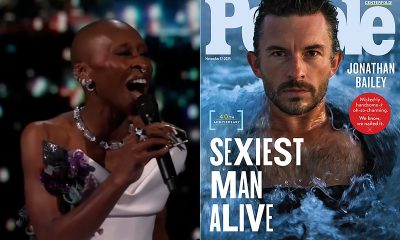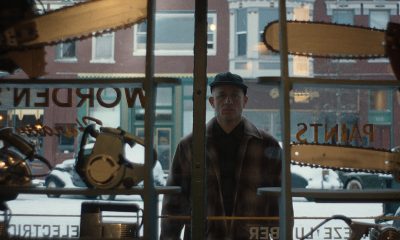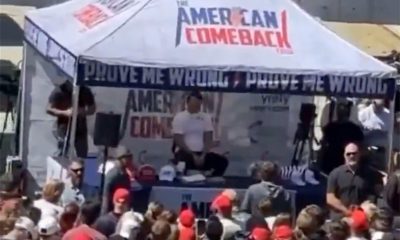Arts & Entertainment
Gay is ‘The New Normal’
Same-sex couple explores parenthood in new Ryan Murphy sitcom
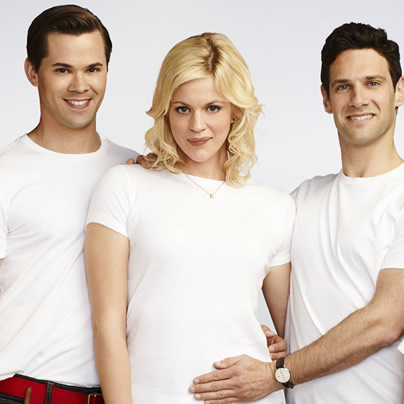
‘The New Normal’
NBC
Tuesdays at 9:30 p.m.
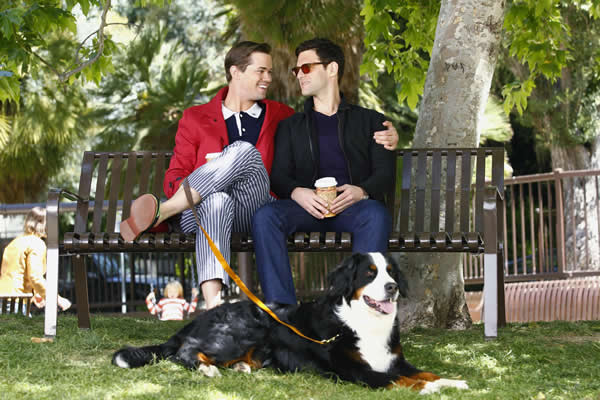
Andrew Rannells as Bryan (left) and Justin Bartha as David in the controversial new NBC comedy ‘The New Normal.’ (Photo courtesy NBC)
Now that “The New Normal” is off and running — an online pilot teased the series while its first two regular broadcasts were Monday and Tuesday this week before settling into its regular Tuesday night time slot — most TV fans know the premise.
This latest creation from gay TV mastermind Ryan Murphy (“Glee,” “Nip/Tuck,” “American Horror Story”), it tells of a happy young gay Los Angeles couple, Bryan (Andrew Rannells) and David (Justin Bartha), who convince new-in-town Goldie (Georgia King) to be a surrogate so they can start a family.
The show’s off to a decent-enough start. Monday night’s network debut found it winning its time slot drawing about 6.9 million viewers, though about 45 percent of those who’d tuned in for lead-in hit “The Voice,” cut out for “Normal.” Some critics are calling the performances a “triumph over content.”
Entertainment Weekly’s Ken Tucker calls Rannells — best known for his Broadway turn in “The Book of Mormon” — “one of the hottest young talents around and he does as much as he can with a role that co-creators Murphy and Ali Adler seem to have conceived as a cross between Charles Nelson Reilly and Rip Taylor; all Bryan is missing is a bag of confetti to throw at his costars after deliving a punchline. It’s to Rannells’ credit that he made the premiere’s attempts at heart tugging, wuch as a home video made for the future baby professing ‘how desperately you are wanted,’ seem heartfelt.”
The San Francisco Chronicle praised its “humor, solid performances” and “snappily written script.” The Los Angeles Times said the pilot “felt flat or programmatic … but much was likable as well, especially the nonchalant tenderness between the male leads.”
During a conference call last week, Rannells, Bartha and King fielded questions on everything from where the show is headed, to working with Murphy to what they think about the controversy the show has generated (Salt Lake City, Utah-based NBC affiliate KSL has refused to air the show though it claimed it was more for the “sexually explicit content, demeaning dialogue and inciting stereotypes” than its “gay characters or LGBT families; Two Utah pro-gay groups in a partnership with GLAAD are screening the show for Utah residents).
“I actually do hope people are offended by it,” Bartha says. “I think hopefully it will get conversations started in family homes and that families who love it will love it for what it is, a compassionate and loving family with many positive aspects. And the ones who are offended by it or find that it strikes them as offensive, hopefully they will maybe realize that they’re bigots and they’re ignorant and possibly our show can usher in a little more acceptance. I don’t expect it to change anyone’s life, but I do think one of the wonderful things about television is its ability to start a conversation, to inspire people to have those watercooler chats maybe the next day. It starts that discourse.”
King, a British actress with extensive film and TV credits, says realizing the show was drawing controversy was “the biggest thrill.”
“It’s bringing up topics and questions and ideas that maybe people haven’t had to consider before,” she says. “It’s a privilege to be doing something that’s starting a great conversation.”
But if the show takes off, where could it possibly go once the pregnancy storyline is played out? Some have questioned whether there’s enough meat to the setting to warrant a long-running series.
Rannells says all early signs are great as far as he’s concerned.
“We’re shooting the fifth episode so far and we’ve read six scripts so far and I have to say, the shows just keep getting better and better. If you’re asking what the second season, the third season and so on will look like, we don’t think of it that way. The main reason we all signed up was because of Ryan and Ali and I think when you see the rest of these episodes, you’ll see that it’s not only a great set up, but in the following episodes, it really does explore the depth of each character and make them each indelible.”
“Ryan’s just been extraordinary,” King says. “He’s got such a wonderful reputation for not being too kind of plucky and fake. He’s very to the point and personally, I absolutely love that. He’s so candid and so clear in his ideas in what he wants and I’m very happy to be there when he’s directing.”
And though he hasn’t said much about his personal life, Bartha admits playing gay with Rannells has been easy.
“From the first time I looked into Andrew’s eyes, I knew I could fall in love,” Bartha says. “I have such a respect for him as an actor and as a person that it was immediately apparent to me that this could work. I just thought he was a funny, good looking, talented guy and he’s easy to be around, so that was the basis of it. … I really wanted to play it as a real couple who love each other and have struggles just like everyone else. Ryan keeps reminding us of that all the time. He’s always saying, ‘Let’s keep this as real as possible.’ It’s funny, but it’s also very, very real. It’s not a sitcom in the classic sense.”
And while it’s ultimately meant to be light hearted and comical, the cast says they hope viewers will take away something deeper.
“What we’re ultimately saying is that what we’re creating is perhaps no different from your family,” Rannells says. “All families basically start as unlikely folks coming together to create this family. Initially it might seem like this is awfully different, but the story we’re telling is really universal.”
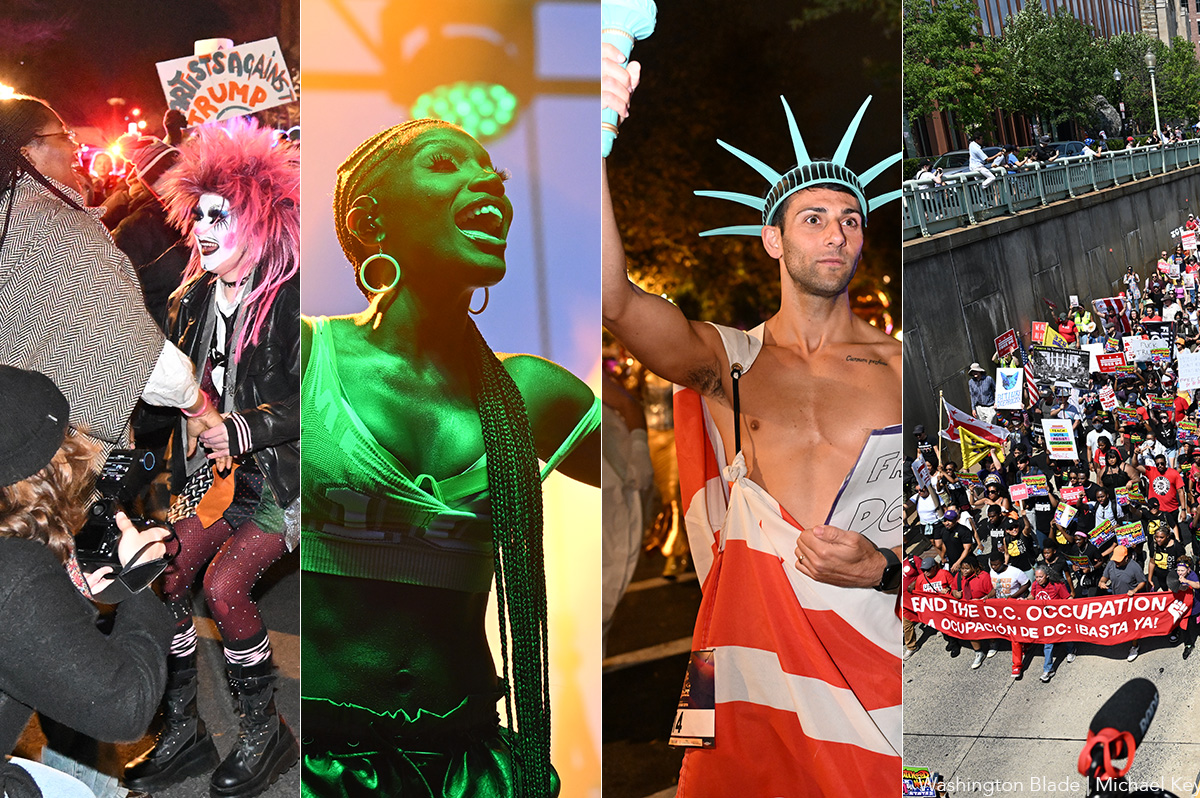
(Washington Blade photos by Michael Key)
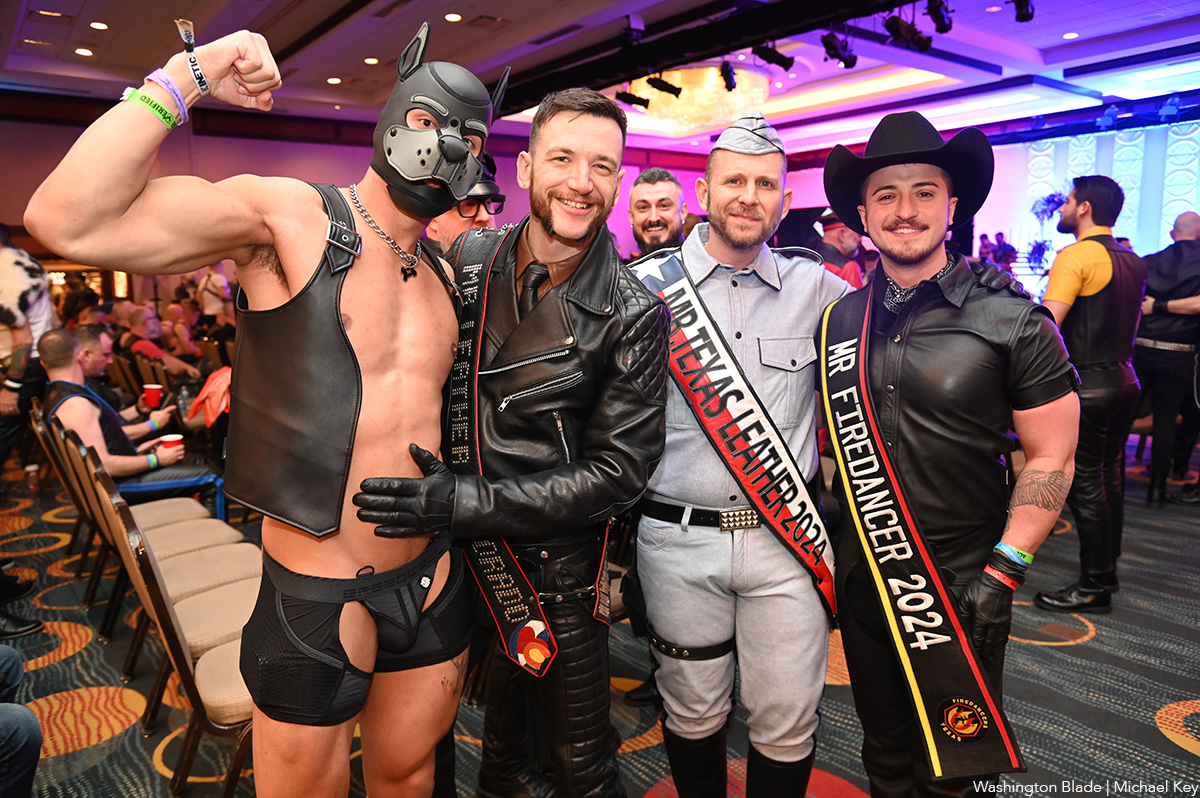
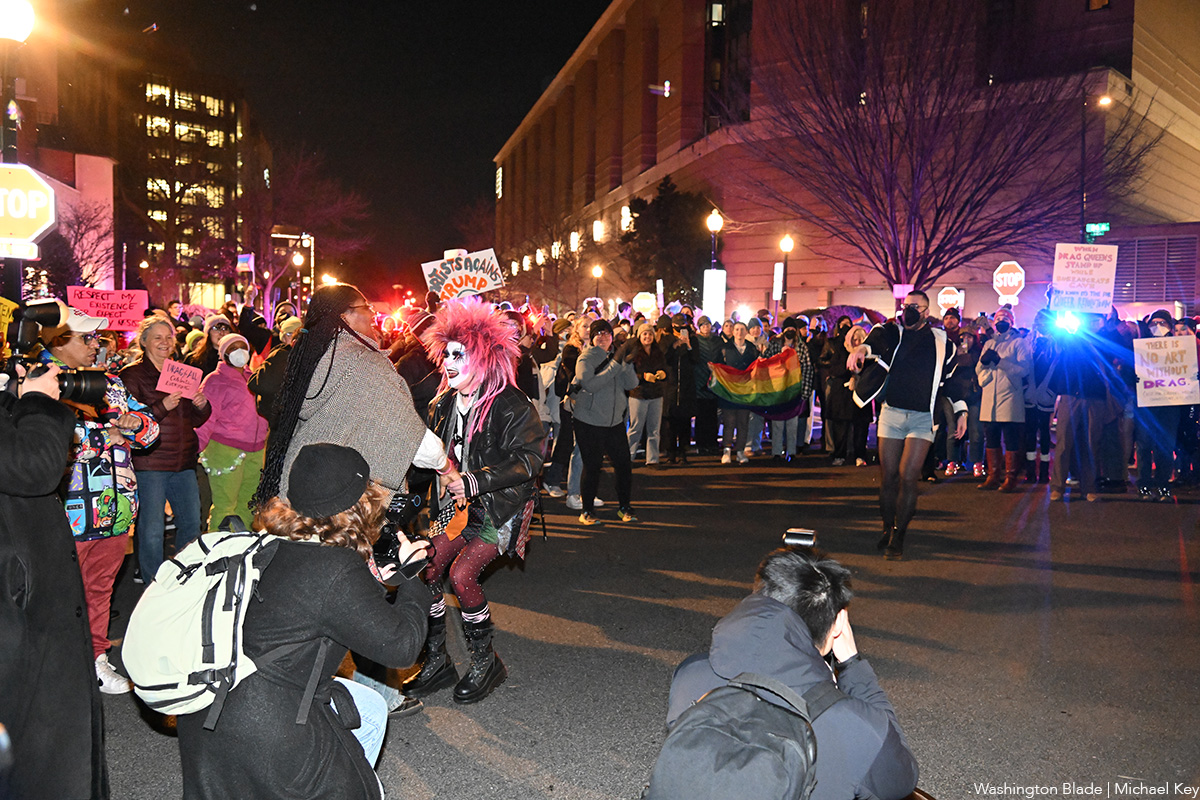
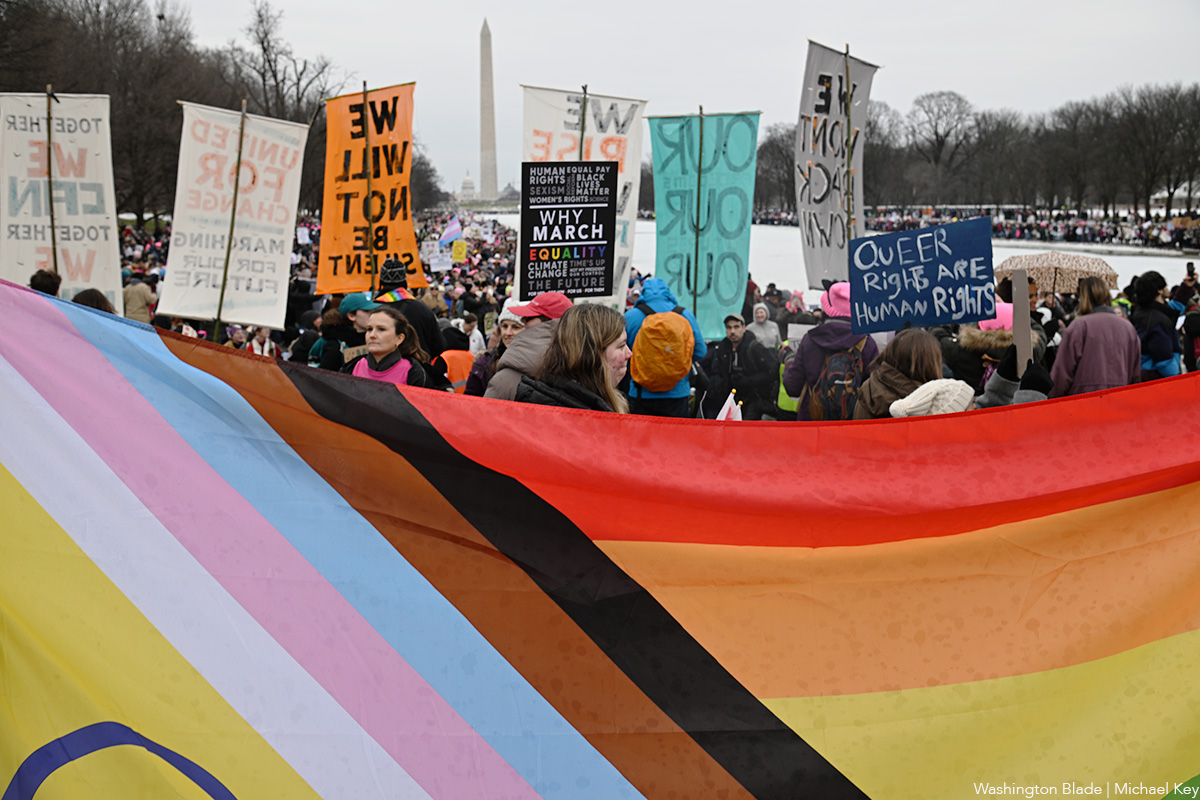
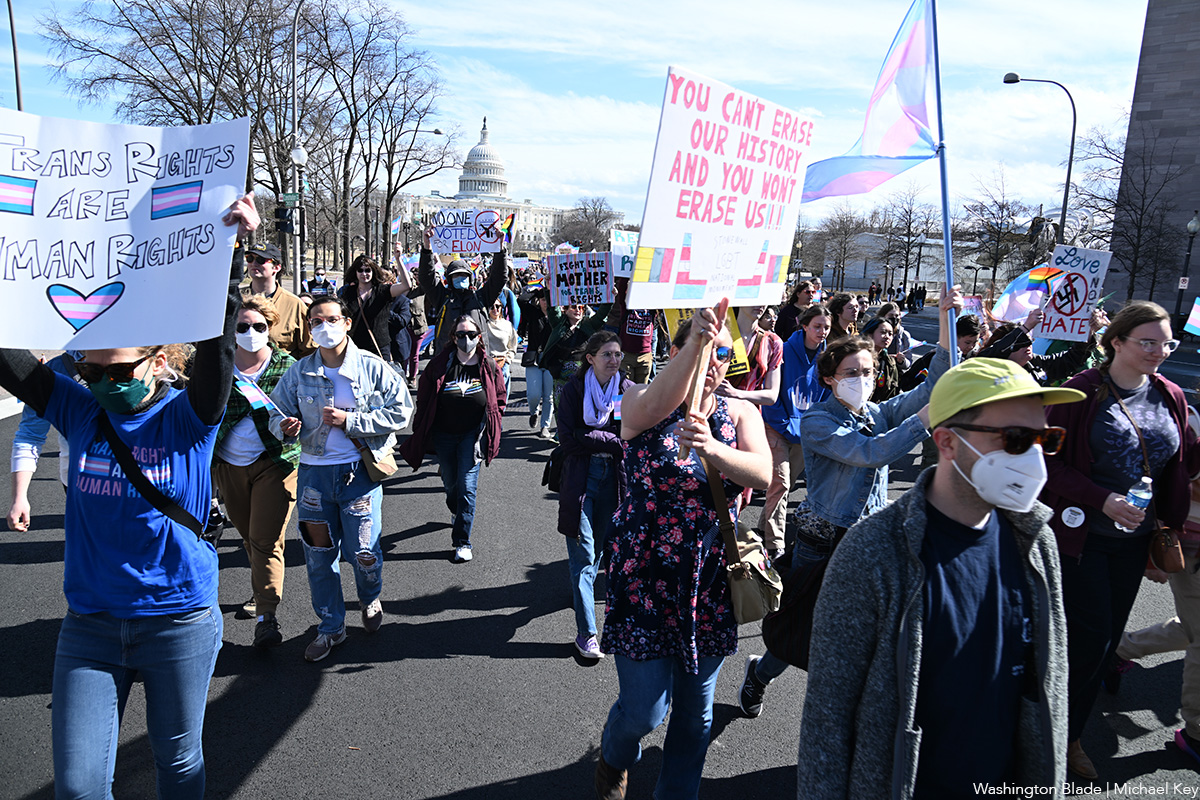

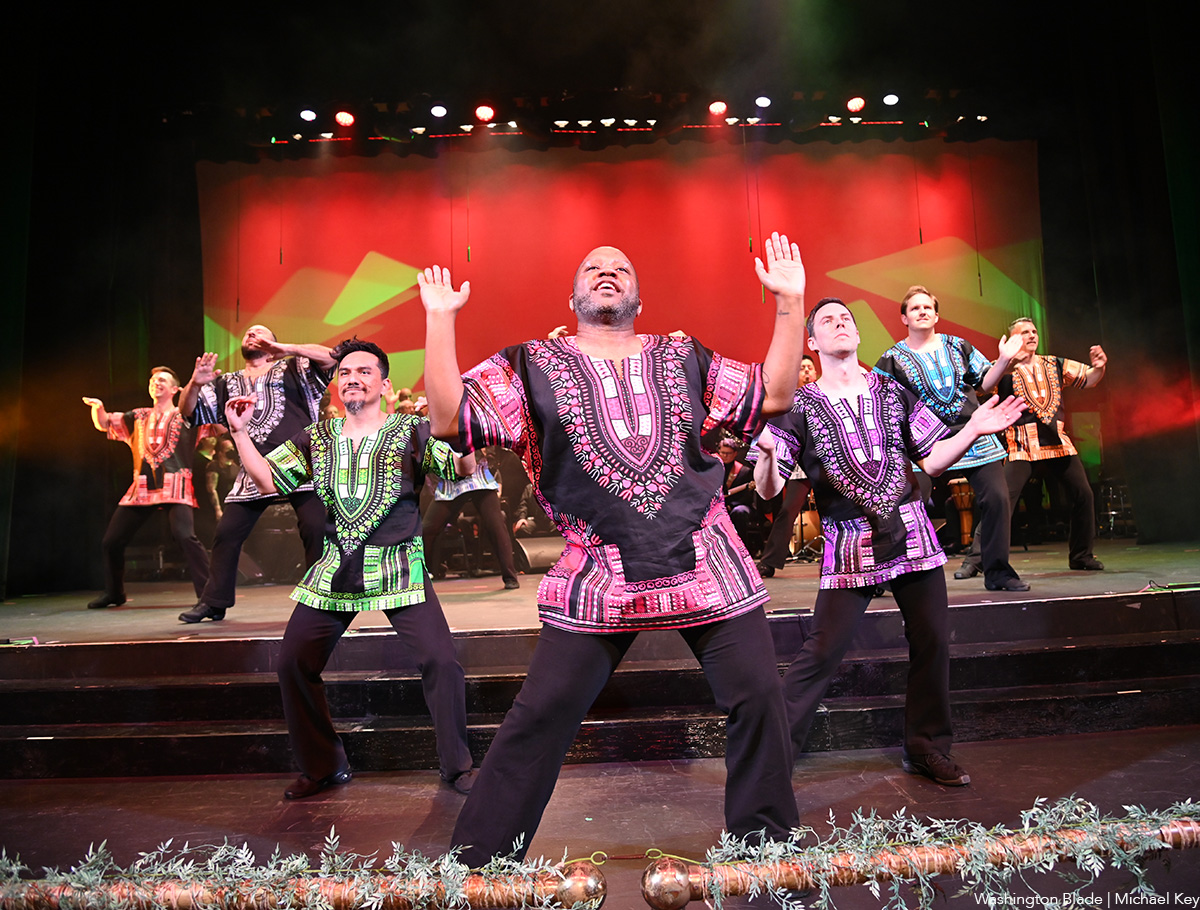
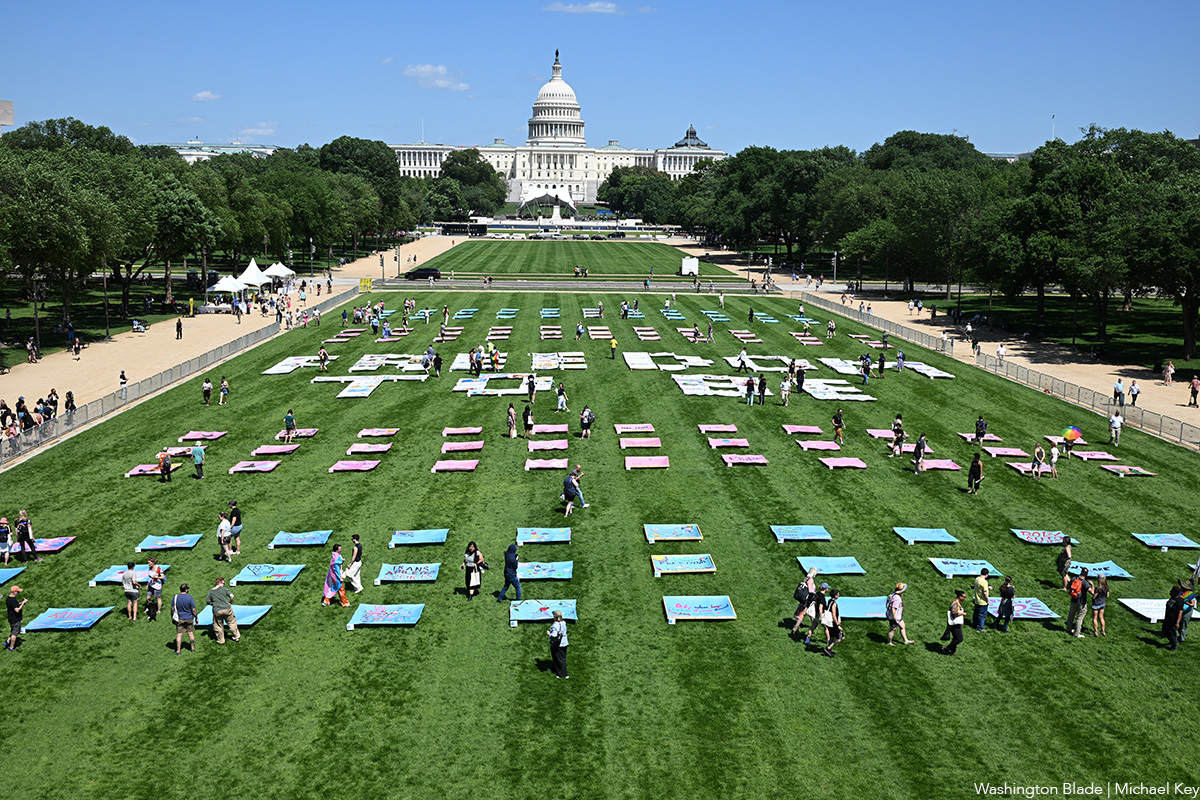
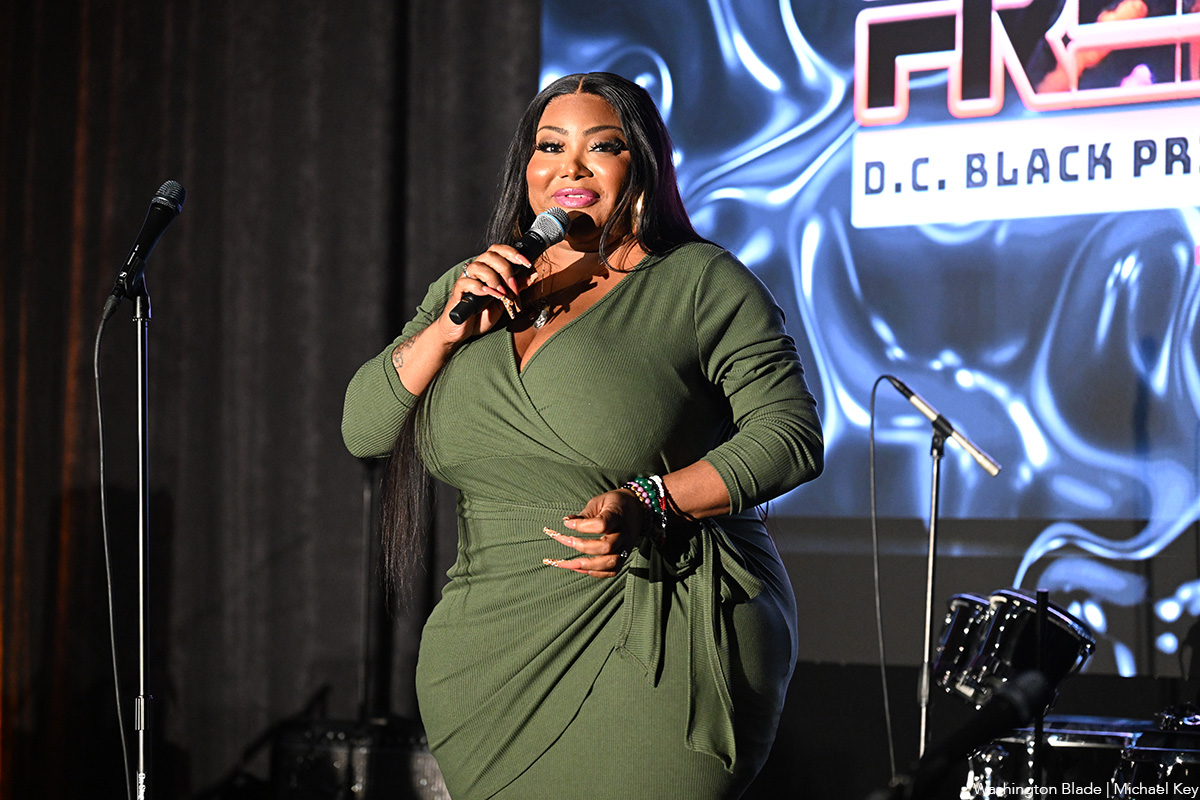
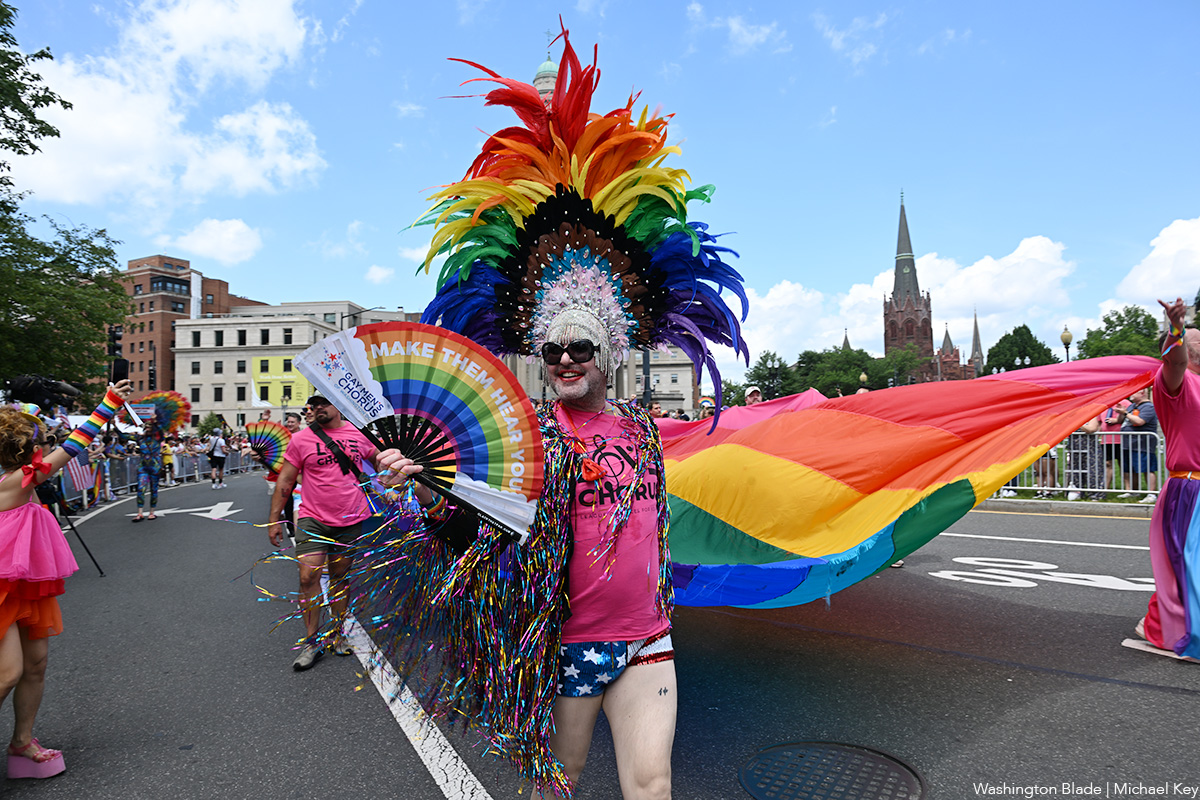
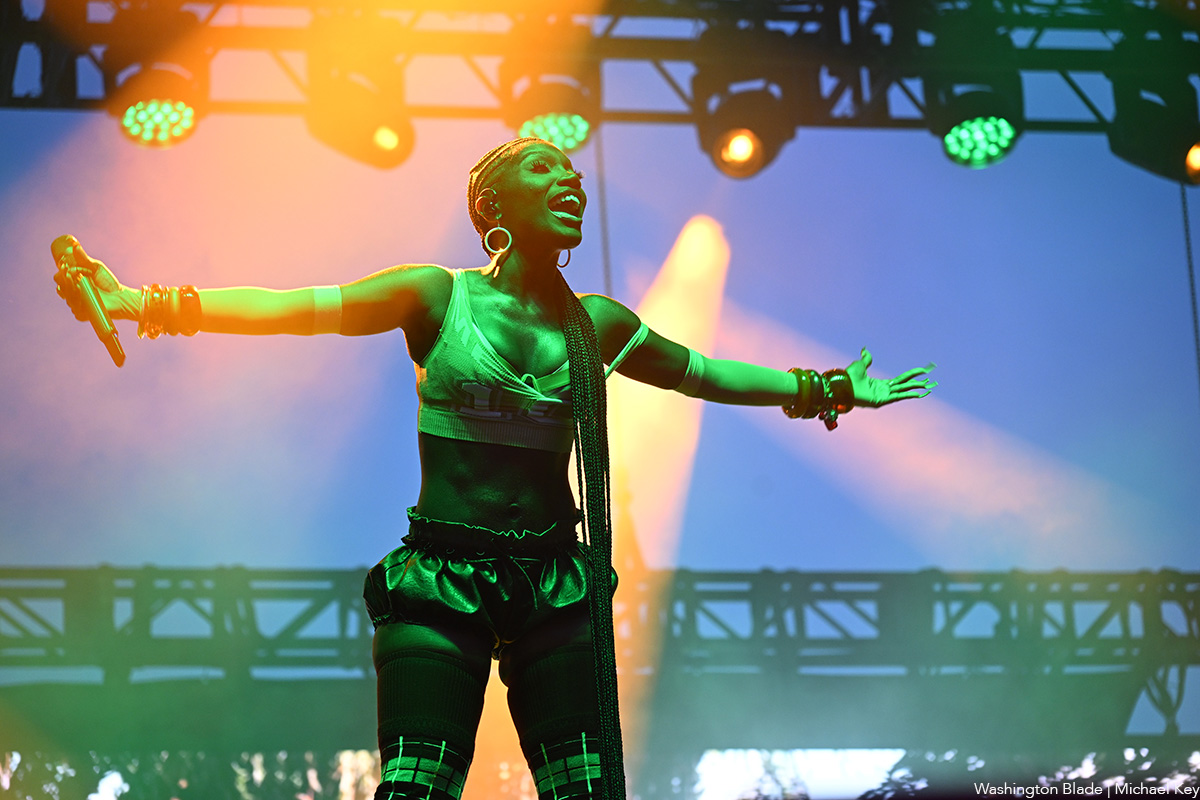
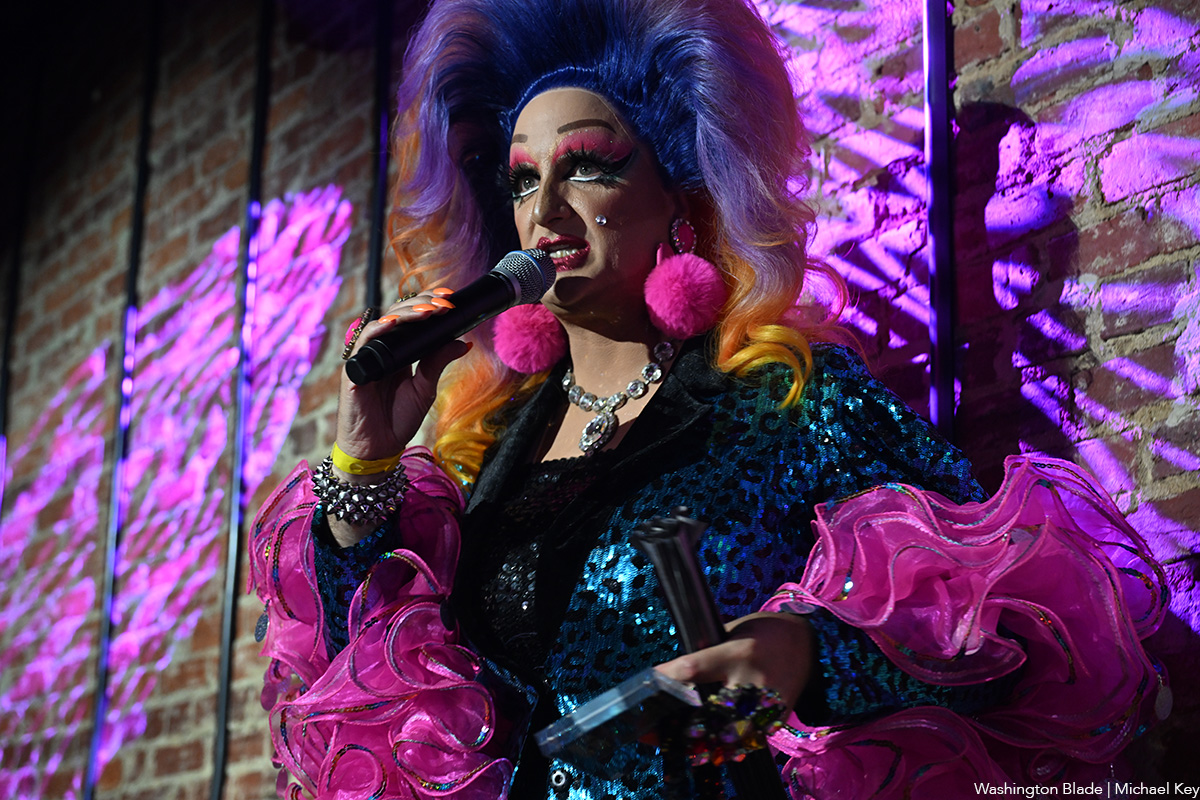
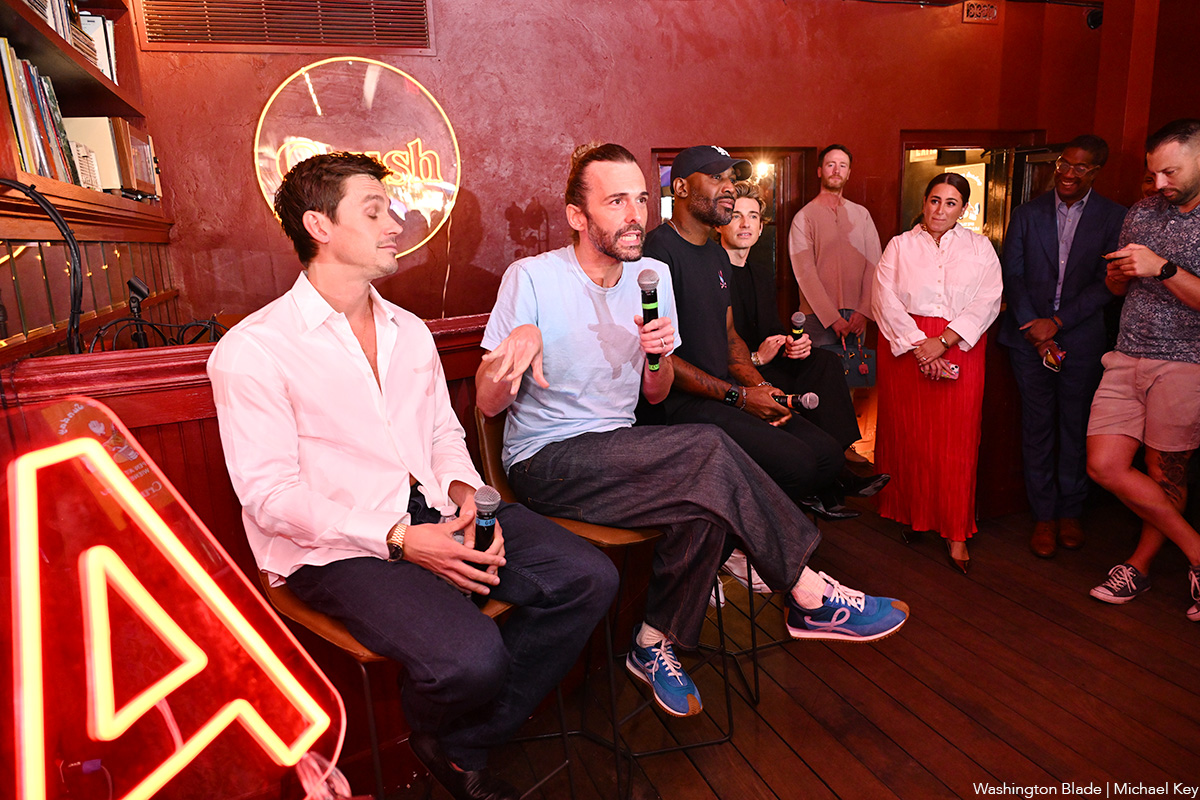

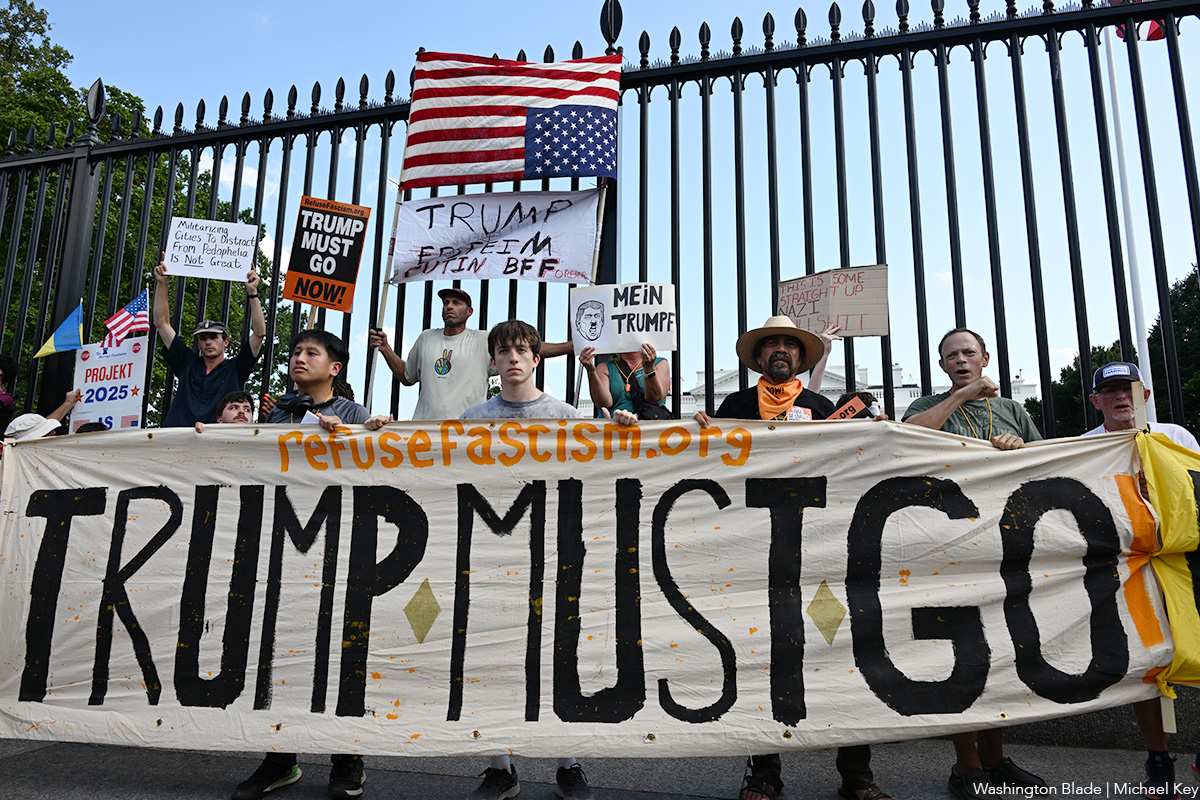
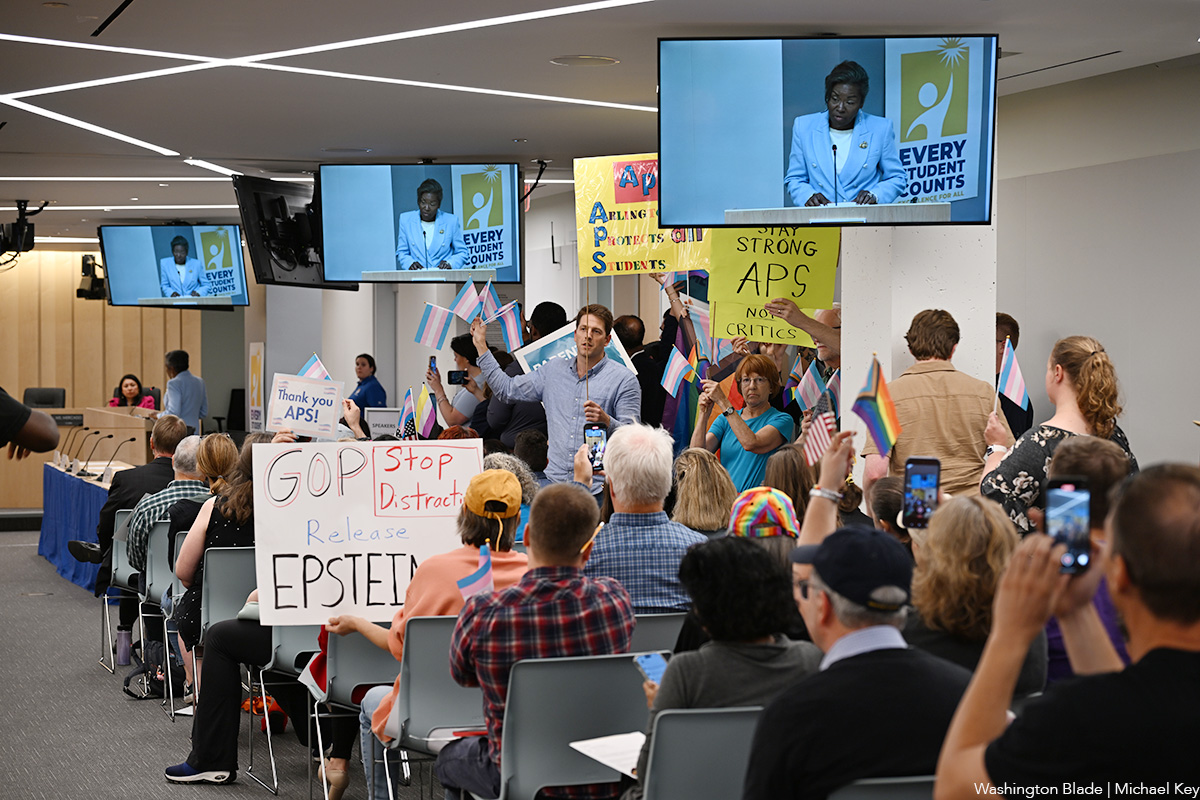
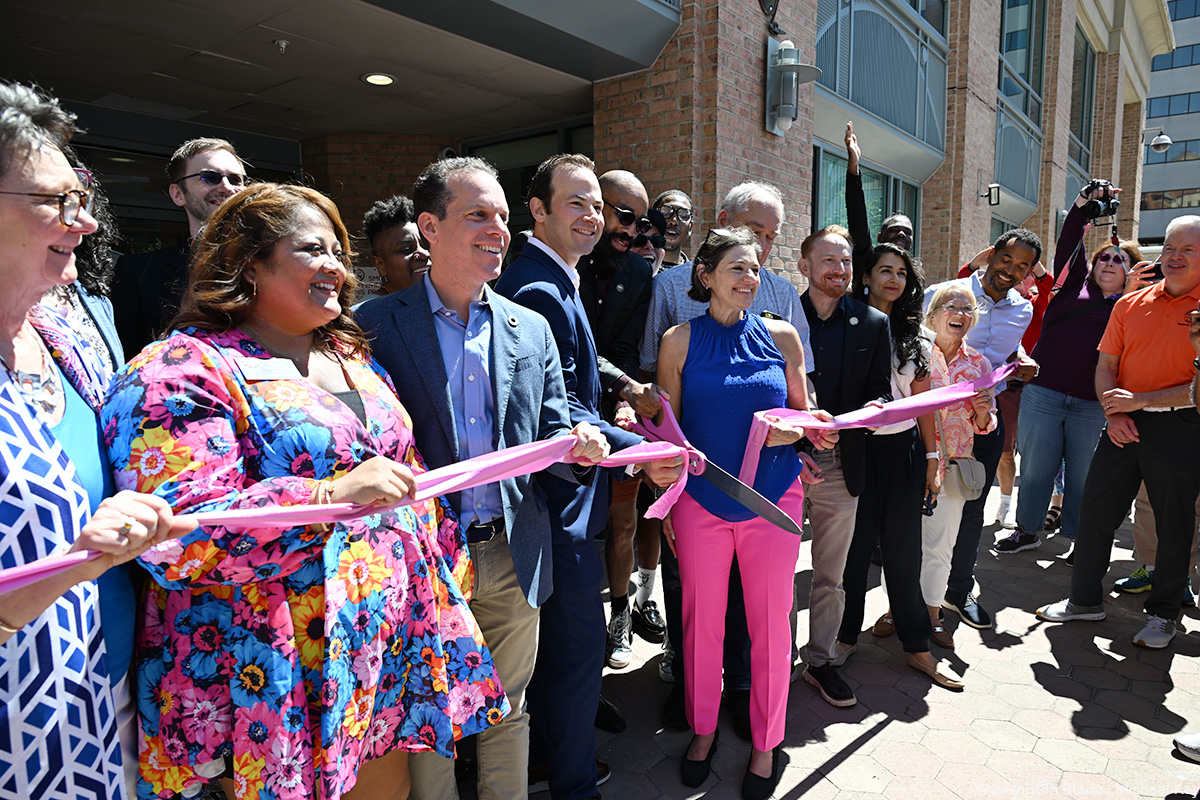
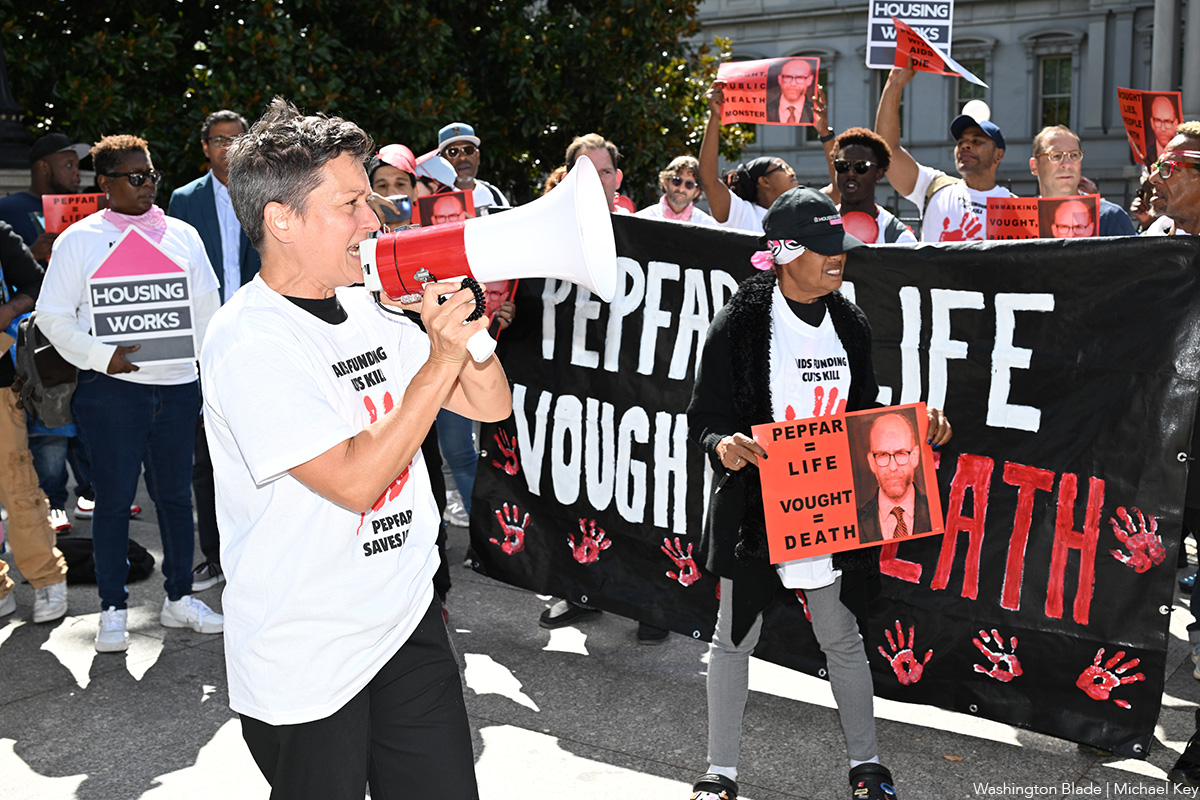
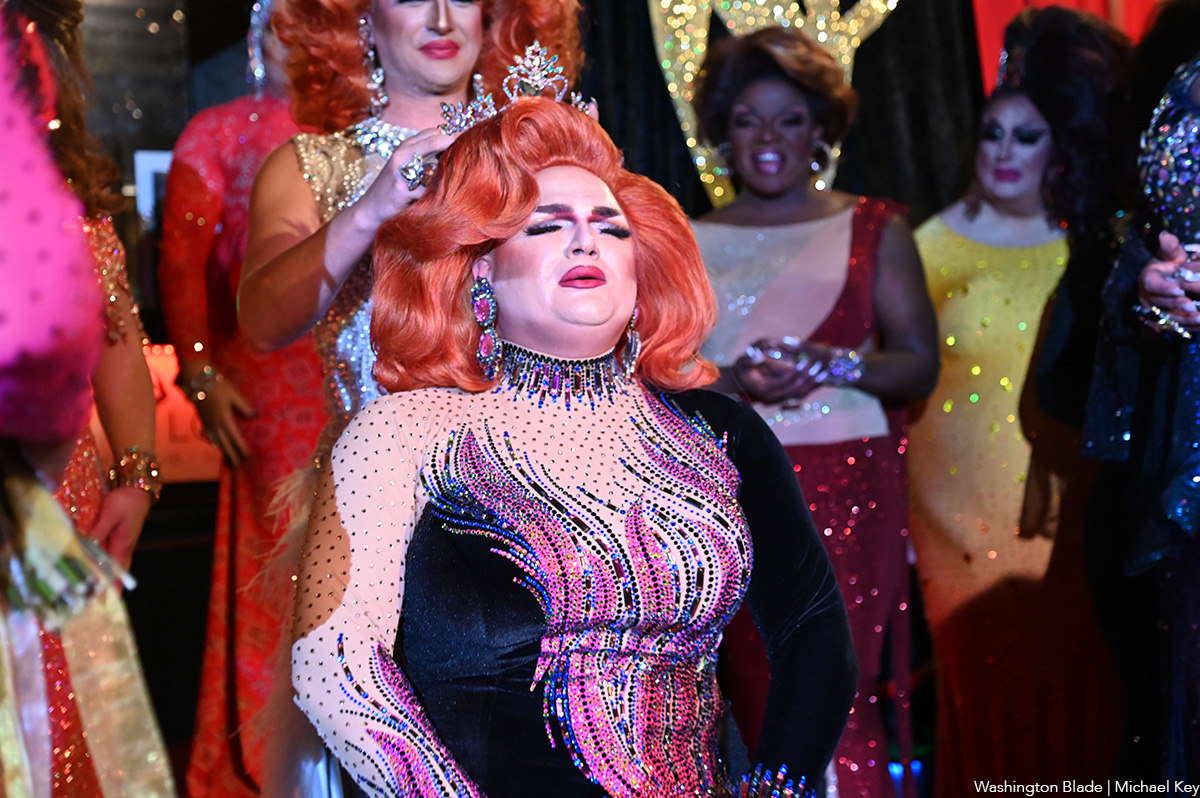

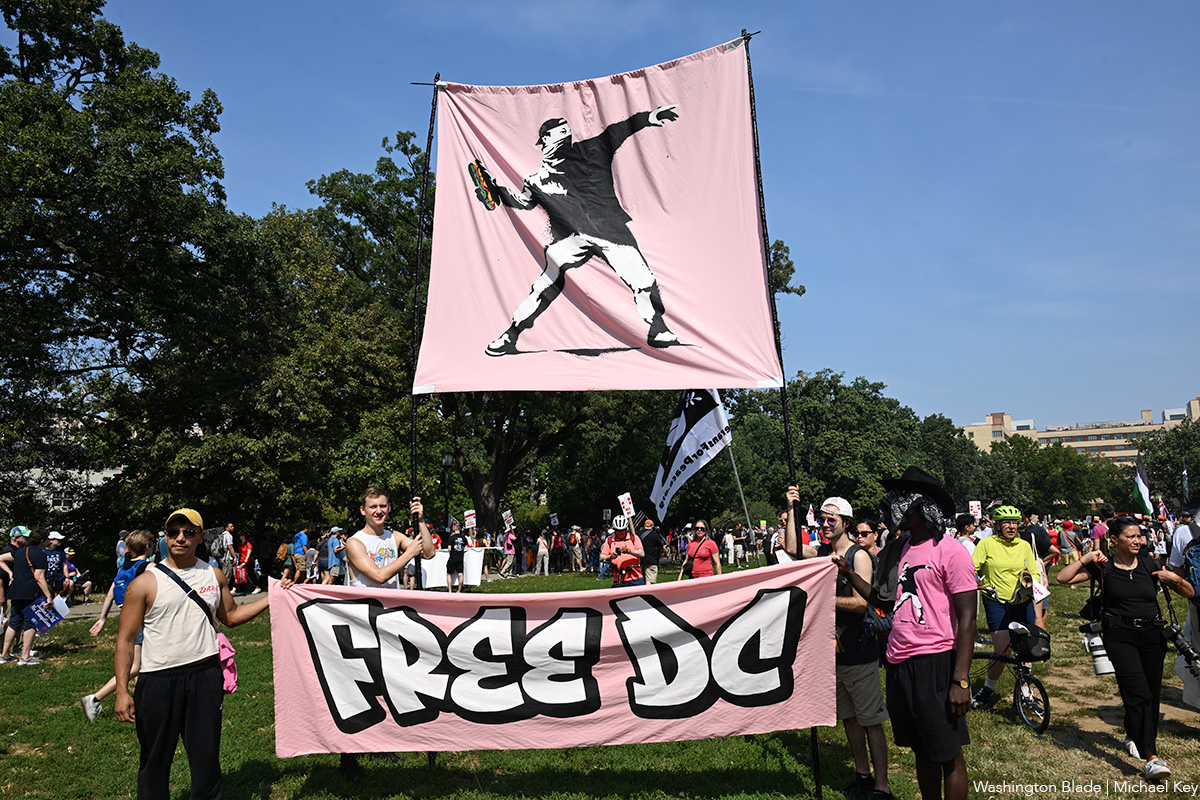
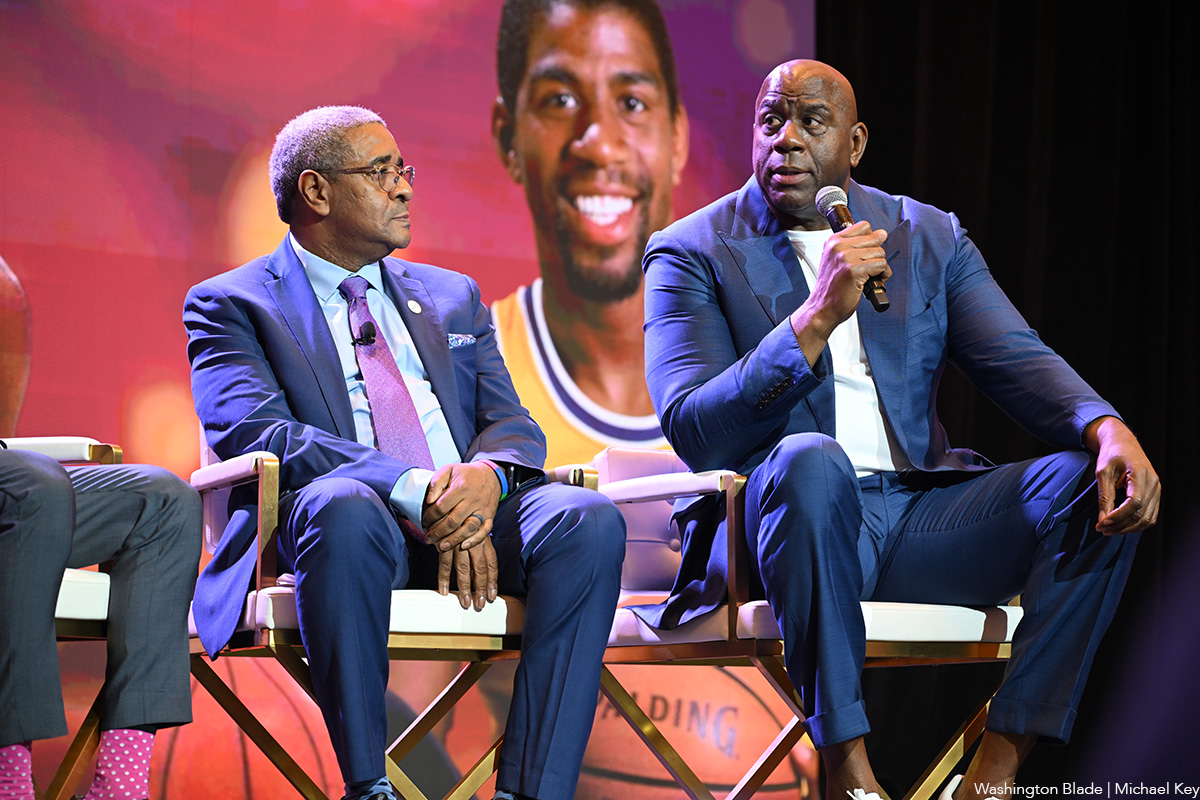
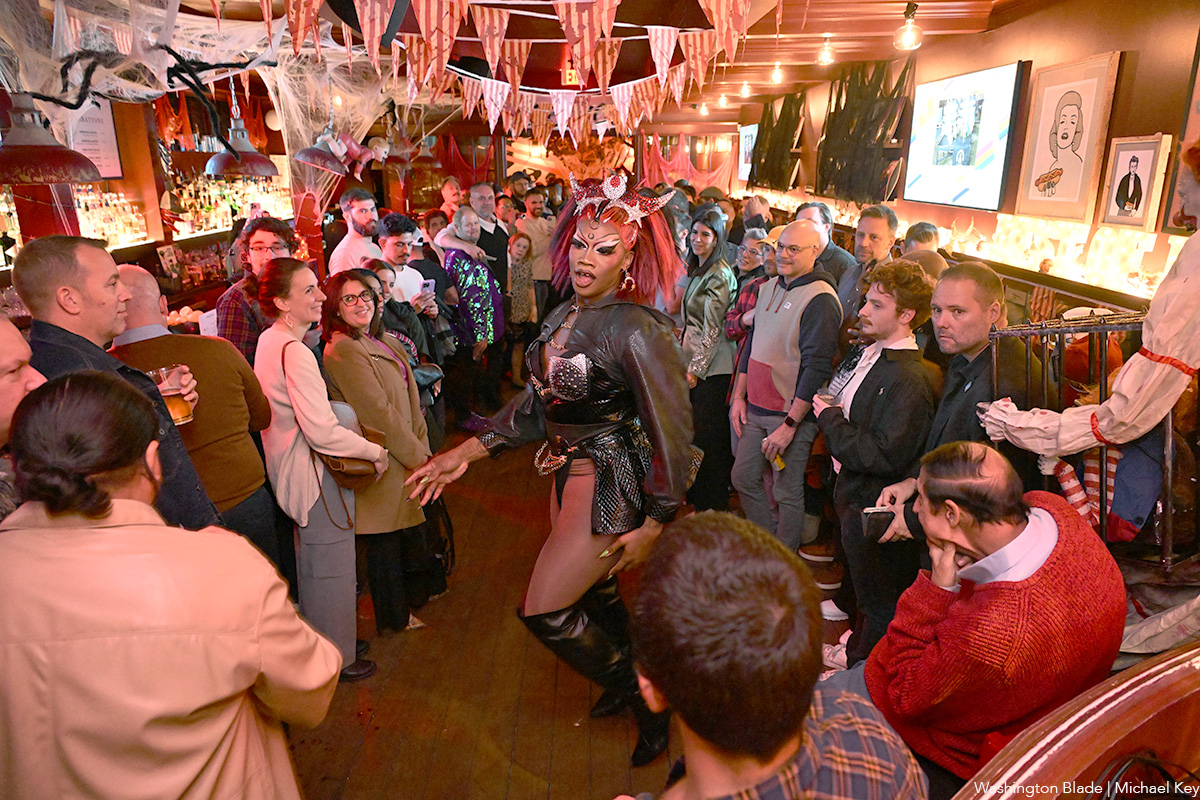
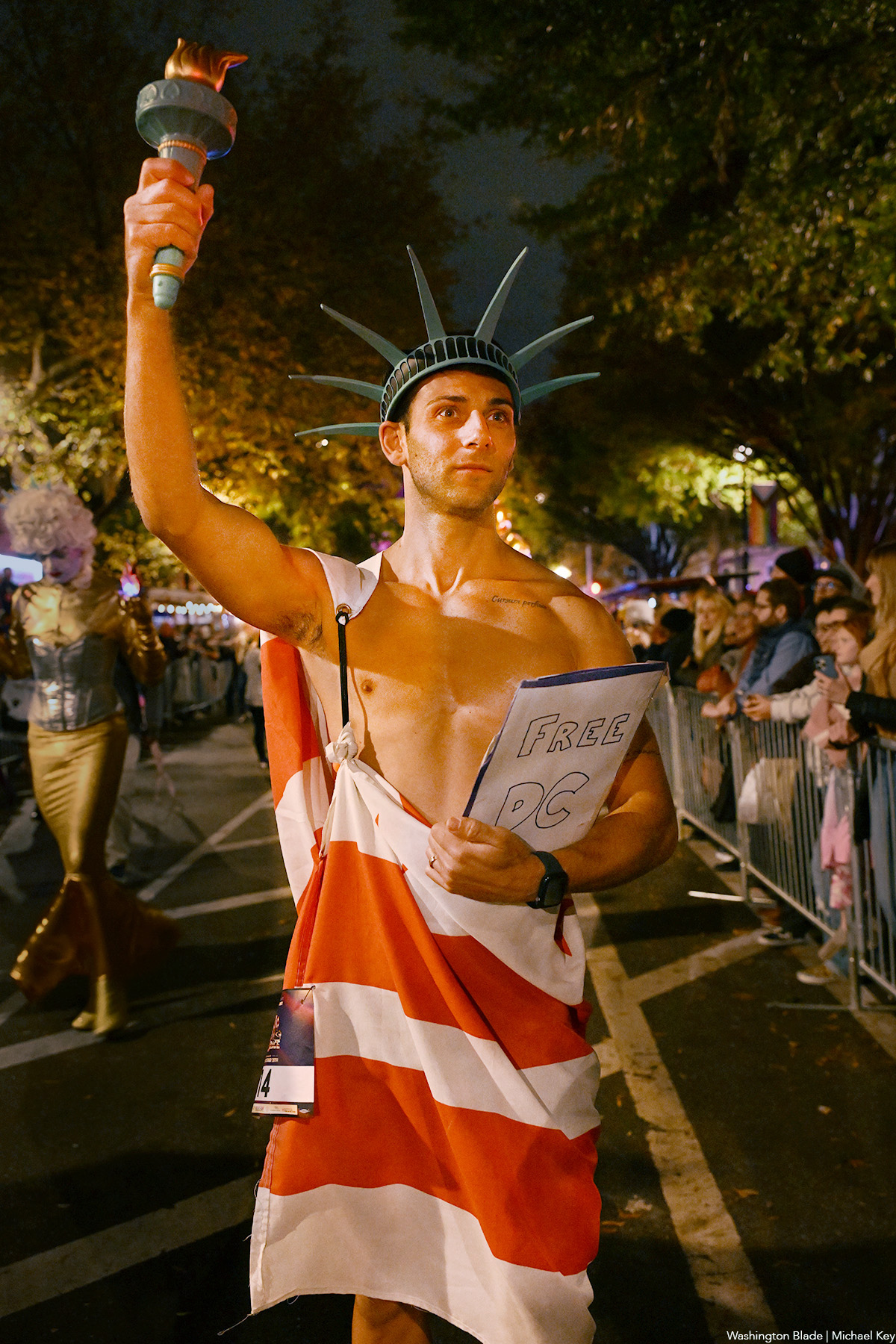
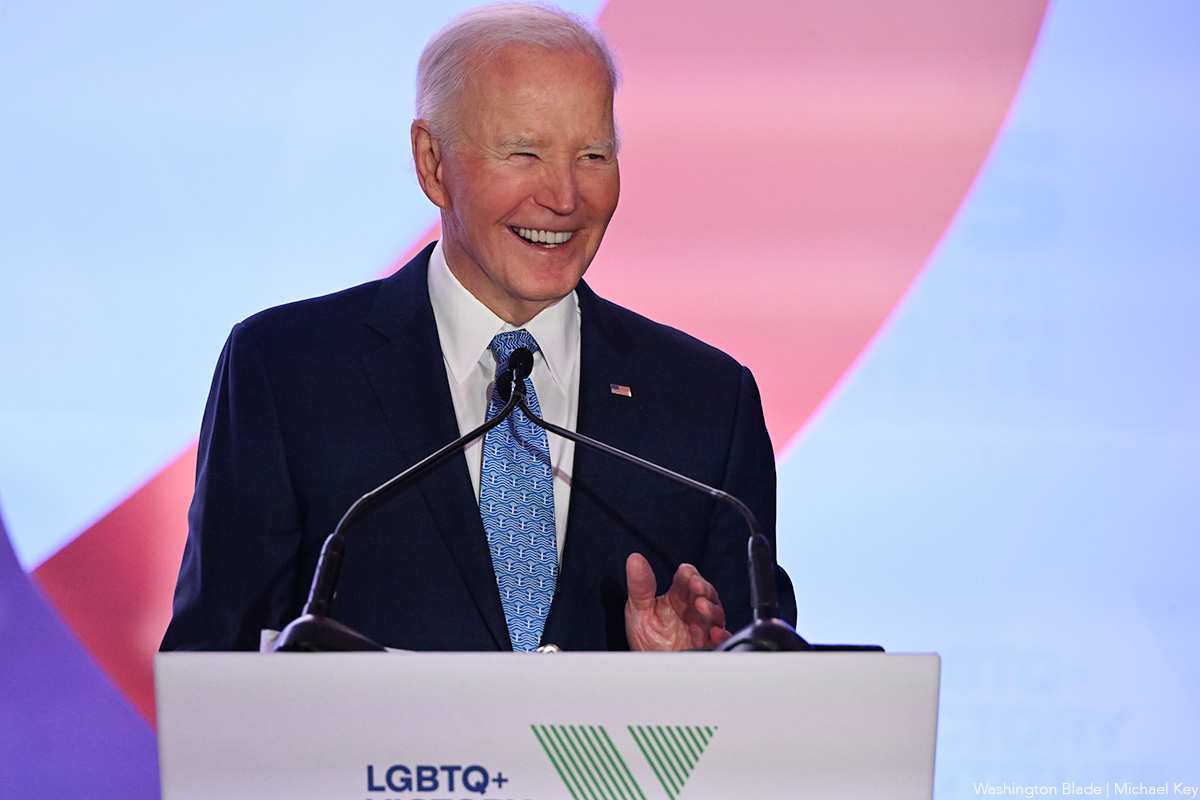
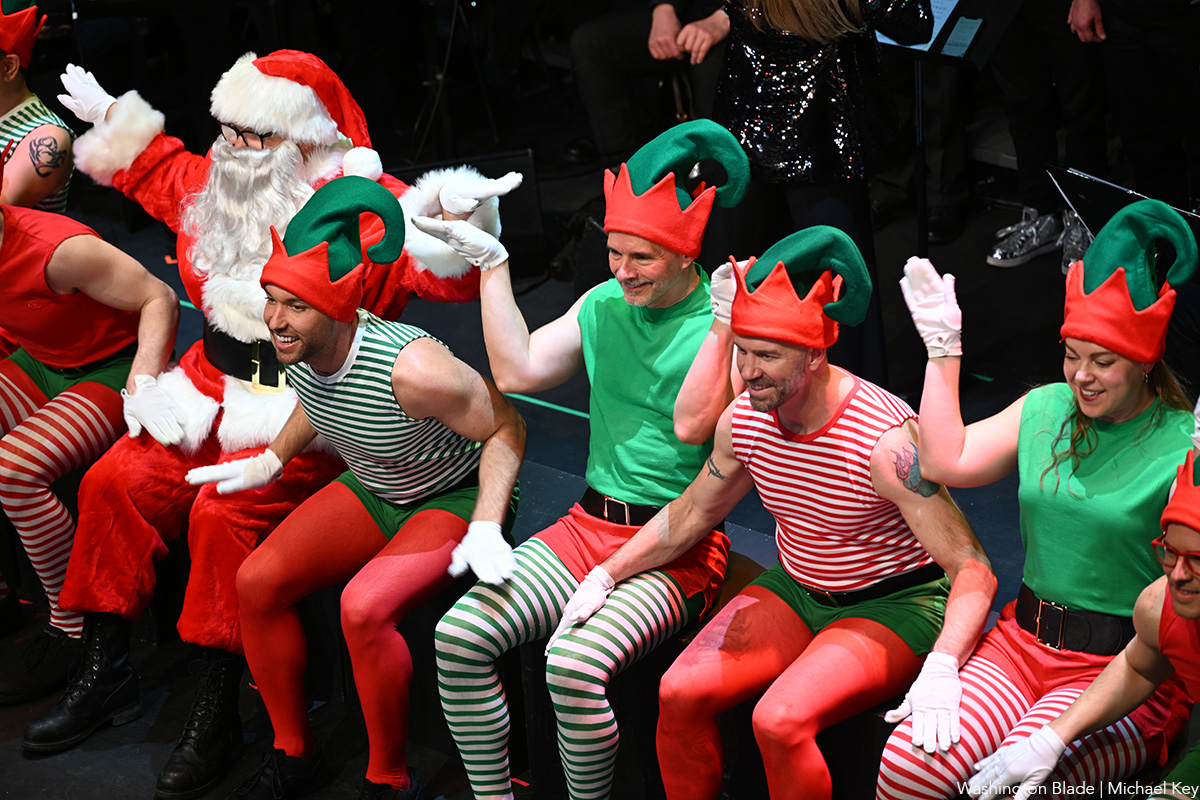

It’s been a year filled with drama and music, re-imaginings and new works. There was a lot on offer in 2025, and much to enjoy. Here are 10 now-closed productions that come to mind.
On Valentine’s Day at Folger Theatre on Capitol Hill, out actor Holly Twyford served as narrator for “The Love Birds” a Folger Consort work that melds medieval music with a world-premiere composition by acclaimed composer Juri Seo and readings from Geoffrey Chaucer’s “A Parlement of Foules”
Standing behind a podium, Twyford beautifully read Chaucer’s words (translated from Middle English and backed by projected slides in the original language), alternating with music played on old and new instruments.
While Mosaic Theater’s “A Case for the Existence of God,” closed in mid-December, it’s proving a production not soon forgotten. Precisely staged by Danilo Gambini, and impressively acted by Lee Orsorio and Jaysen Wright, the soul-searching two hander by out playwright Samuel D. Hunter, tells the story of two men who form an unlikely friendship based on single-fatherhood, a specific sadness, and hope.
The action unfolds in a small office in southern Idaho, where the pair discuss the perplexing terms of a mortgage loan while delving deep into their lives and backgrounds. Nothing is left off the table.
Shakespeare Theatre Company’s spring production of “Uncle Vanya” gave audiences something both fresh yet enduring. Staged by STC’s artistic director Simon Godwin, the production put an impeccably pleasing twist on Russian playwright Anton Chekhov’s classic. It ranks among the very best area productions of the year.
Featuring a topnotch cast led by Hugh Bonneville (TV’s “Downton Abbey”) in the title role, the play was set on an unfinished stage cluttered with costume racks and assorted props, all assembled by crew uniformed in black and actors in street clothes. Throughout the drama tinged with comedy, the actors continued to assist with ever increasingly period set changes accompanied by an underscore of melancholic cello strings. It was innovative and wonderful.
GALA Hispanic Theatre’s production of Manuel Puig’s “Kiss of the Spider Woman” was an intimate and affecting piece of theater. Staged by José Luis Arellano, it starred out actors Rodrigo Pedreira and Martín Ruiz as two very different men whose paths cross as convicts in an Argentine prison.
Arena Stage scored with a re-imagined and updated take on the widely liked musical “Damn Yankees.” Directed by Sergio Trujillo, the Broadway bound production has been “gently re-tooled for its first major revival in the 21st century,” moving the action from the struggling Washington Senators baseball team to the turn-of-the-century Yankees lineup. Ana Villafañe’s charmingly seductive Lola and a chorus of fit ball players made for a good time.
Also at Arena, out playwright Reggie D. White’s new work “Fremont Ave.” was very well received. A semi-autobiographical glimpse into home and the many definitions of that idea specifically relating to three generations of Black men, the work boasts a third act with a deeply queer storyline to boot.
Before his smash hit “Hamilton” transformed Broadway, Lin-Manuel Miranda wrote “In the Heights,” a seminal musical set against the vicissitudes of an upper Manhattan bodega. Infused with hip-hop, rap, and pop ballads, the romance/dramedy takes place over a lively few days in the vibrant, close-knit Latin neighborhood, Washington Heights.
Signature Theatre’s exciting take on “In the Heights” featured a talented cast including out actor Ángel Lozado as the bodega owner who figures prominently in the barrio and the action.
Studio Theatre’s recent production of lesbian playwright Paula Vogel’s newest work “The Mother Play,” a drama with humor, is about a well put together alcoholic mother and her two gay children living under difficult circumstances in the less glitzy parts of suburban Maryland. With nuanced performances and smart direction, the production was terrific.
Keegan Theatre surpassed expectations with its production of “Lizzie” a punk rock opera about Miss Borden, the fabled axe wielding title character. Performed by a super all-female cast, they belted a score that hits hard on subjects like money, queerness, and strained (to say the least) family relationships.
Round House Theatre impressed autumn audiences with “The Inheritance,” a two-part drama sensitively staged by out director Tom Story and acted by a mostly queer cast that included young actor Jordi Bertrán Ramírez in a breakout performance.
Penned by out playwright Matthew López, the epic work inspired by E.M. Forster’s novel “Howards End,” explores themes of love, legacy, and the AIDS crisis through the lives of three generations of gay men in New York City.
Prior to opening, Story commented that with the production’s predominately queer cast you get actors who “really understand the situation, the humor, and the struggle. It works well.” And he was right.
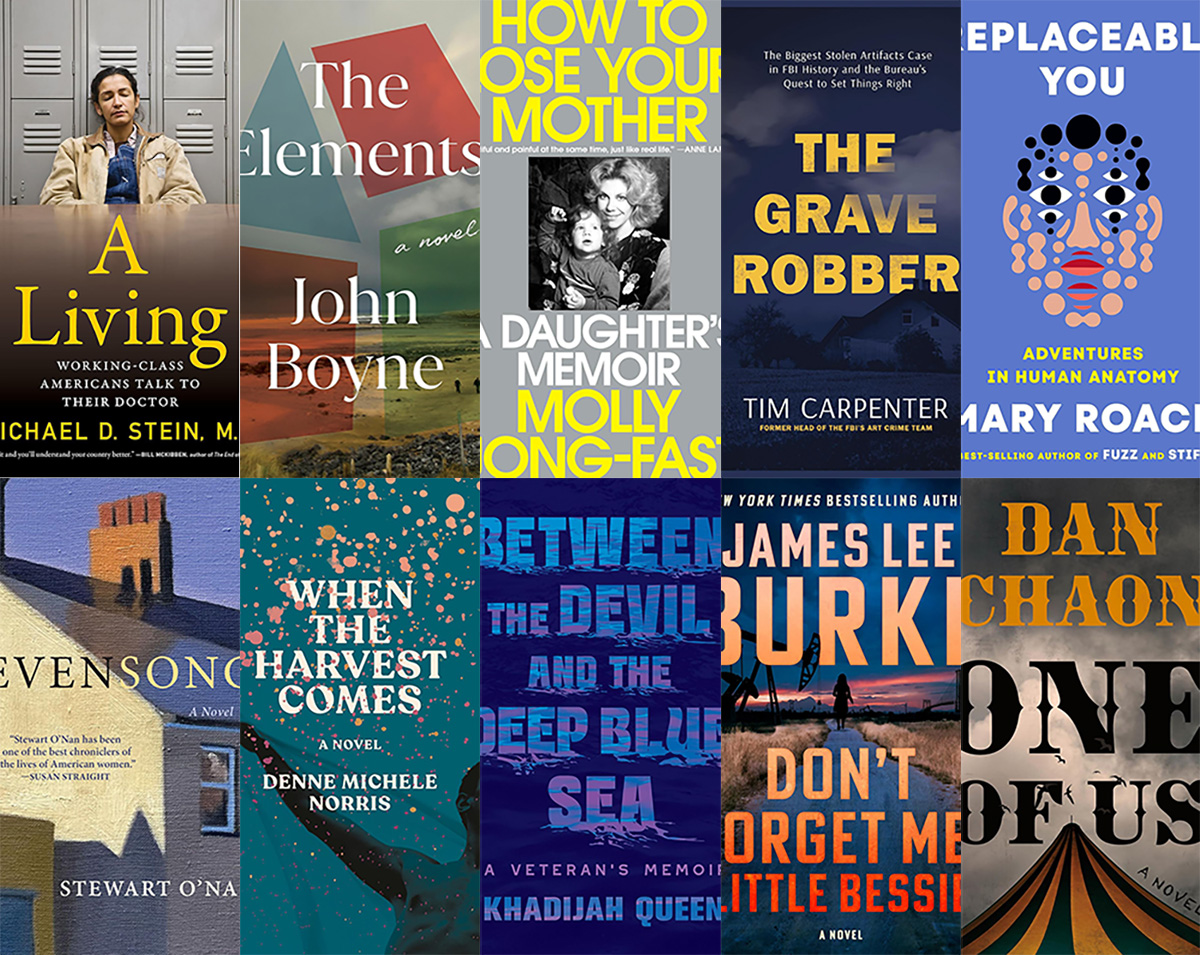
This past year, you’ve often had to make do.
Saving money here, resources there, being inventive and innovative. It’s a talent you’ve honed, but isn’t it time to have the best? Yep, so grab these Ten Best of 2025 books for your new year pleasures.
Nonfiction
Health care is on everyone’s mind now, and “A Living: Working-Class Americans Talk to Their Doctor” by Michael D. Stein, M.D. (Melville House, $26.99) lets you peek into health care from the point of view of a doctor who treats “front-line workers” and those who experience poverty and homelessness. It’s shocking, an eye-opening book, a skinny, quick-to-read one that needs to be read now.
If you’ve been doing eldercare or caring for any loved one, then “How to Lose Your Mother: A Daughter’s Memoir” by Molly Jong-Fast (Viking, $28) needs to be in your plans for the coming year. It’s a memoir, but also a biography of Jong-Fast’s mother, Erica Jong, and the story of love, illness, and living through the chaos of serious disease with humor and grace. You’ll like this book especially if you were a fan of the author’s late mother.
Another memoir you can’t miss this year is “Between the Devil and the Deep Blue Sea: A Veteran’s Memoir” by Khadijah Queen (Legacy Lit, $30.00). It’s the story of one woman’s determination to get out of poverty and get an education, and to keep her head above water while she goes below water by joining the U.S. Navy. This is a story that will keep you glued to your seat, all the way through.
Self-improvement is something you might think about tackling in the new year, and “Replaceable You: Adventures in Human Anatomy” by Mary Roach (W.W. Norton & Company, $28.99) is a lighthearted – yet real and informative – look at the things inside and outside your body that can be replaced or changed. New nose job? Transplant, new dental work? Learn how you can become the Bionic Person in real life, and laugh while you’re doing it.
The science lover inside you will want to read “The Grave Robber: The Biggest Stolen Artifacts Case in FBI History and the Bureau’s Quest to Set Things Right” by Tim Carpenter (Harper Horizon, $29.99). A history lover will also want it, as will anyone with a craving for true crime, memoir, FBI procedural books, and travel books. It’s the story of a man who spent his life stealing objects from graves around the world, and an FBI agent’s obsession with securing the objects and returning them. It’s a fascinating read, with just a little bit of gruesome thrown in for fun.
Fiction
Speaking of a little bit of scariness, “Don’t Forget Me, Little Bessie” by James Lee Burke (Atlantic Monthly Press, $28) is the story of a girl named Bessie and her involvement with a cloven-hooved being who dogs her all her life. Set in still-wild south Texas, it’s a little bit western, part paranormal, and completely full of enjoyment.
“Evensong” by Stewart O’Nan (Atlantic Monthly Press, $28) is a layered novel of women’s friendships as they age together and support one another. The characters are warm and funny, there are a few times when your heart will sit in your throat, and you won’t be sorry you read it. It’s just plain irresistible.
If you need a dark tale for what’s left of a dark winter season, then “One of Us” by Dan Chaon (Henry Holt, $28), it it. It’s the story of twins who become orphaned when their Mama dies, ending up with a man who owns a traveling freak show, and who promises to care for them. But they can’t ever forget that a nefarious con man is looking for them; those kids can talk to one another without saying a word, and he’s going to make lots of money off them. This is a sharp, clever novel that fans of the “circus” genre shouldn’t miss.
“When the Harvest Comes” by Denne Michele Norris (Random House, $28) is a wonderful romance, a boy-meets-boy with a little spice and a lot of strife. Davis loves Everett but as their wedding day draws near, doubts begin to creep in. There’s homophobia on both sides of their families, and no small amount of racism. Beware that there’s some light explicitness in this book, but if you love a good love story, you’ll love this.
Another layered tale you’ll enjoy is “The Elements” by John Boyne (Henry Holt, $29.99), a twisty bunch of short stories that connect in a series of arcs that begin on an island near Dublin. It’s about love, death, revenge, and horror, a little like The Twilight Zone, but without the paranormal. You won’t want to put down, so be warned.
If you need more ideas, head to your local library or bookstore and ask the staff there for their favorite reads of 2025. They’ll fill your book bag and your new year with goodness.
Season’s readings!
The Blade may receive commissions from qualifying purchases made via this post.

